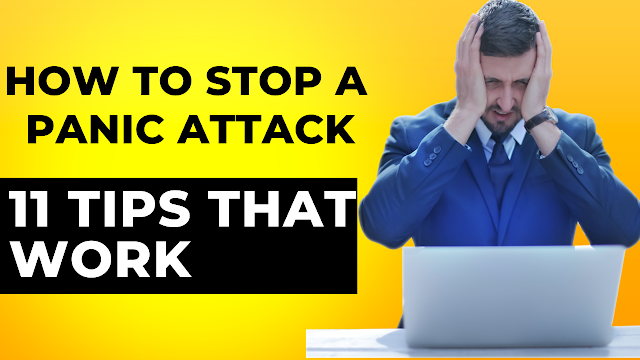Read more
How to Stop A Panic Attack 11 Tips That
Work
Panic attacks are a common and intense experience of
fear or distress that can strike at any moment. While they may seem scary, it
is possible to stop a panic attack by taking certain steps. Here are 11 Tips
that can help you regain control during a panic attack and prevent them from
happening in the future.
Acknowledge What is Happening:
The most vital phase in halting a fit of anxiety is to
perceive that it is working out. Identifying the symptoms, such as rapid
heartbeat, sweating, and shaking, can help you understand that it is just a
panic attack and not a serious health problem.
Focus on Breathing:
During a panic attack, your breathing can become
shallow and rapid, which can increase feelings of anxiety. By focusing on slow,
deep breaths, you can help calm down and reduce the physical symptoms of a
panic attack. Try
breathing in slowly through your nose, counting to four. Hold your breath for a
count of four, and then slowly exhale through your mouth, counting to four.
Repeat this pattern for several breath.
Use Positive Self-Talk:
Panic attacks can be intensified by negative thoughts.
Instead, try to replace these with positive self-talk, such as “I am safe,”
“This will pass,” or “I can handle this”. Try to concentrate on what is
happening in the present moment and not on your thoughts or worries.
Practice Progressive Muscle Relaxation:
Tense and release the muscles in your body, starting
with your feet and working your way up to your head. This can help to relieve
tension and reduce physical symptoms of anxiety.
Use Visualization Techniques:
Picture a peaceful and calming place, such as a beach
or a forest,
or
a mountain top and imagine yourself there. Focus on the details of your
surroundings, and let your mind rest in this peaceful environment.
This can help you focus on something other than your panic attack and calm
down.
Engage in Physical activity:
Going for a walk, doing some light exercise, or even
just stretching can help to release tension and calm down.
Distract yourself:
Try to focus on something else, such as a book, a
movie, or a conversation with a friend. This can help to take your mind off the
panic attack and reduce its intensity.
Seek Support from Others:
Talking to a trusted friend or family member about
your panic attack can help to relieve feelings of loneliness and isolation.
Practice Relaxation Techniques:
Yoga, meditation, or mindfulness can be effective in
reducing feelings of anxiety and stress. Practice mindfulness techniques such
as meditation or yoga to help you stay in the present moment.
Consider Therapy:
Cognitive-behavioral therapy (CBT) can help you
identify and change negative thought patterns that contribute to panic attack.
Avoid Triggers:
Try to identify the things that trigger your panic
attacks, such as specific situations or activities, and avoid them if possible.
Conclusion:
In conclusion, panic attacks can be frightening, but
there are many steps you can take to stop them. By focusing on breathing,
positive self-talk, and other techniques, you can regain control and prevent
panic attacks from happening in the future. If you continue to experience panic
attacks, consider speaking with a mental health professional for further sport.
It is also important to seek professional help if you
are experiencing panic attacks frequently. A mental health professional can
help you develop coping strategies and address the underlying causes of your
panic attack.
It's
important to remember that panic attacks are a treatable condition, and with
the help of a mental health professional, you can learn to manage and overcome
them.








0 Reviews